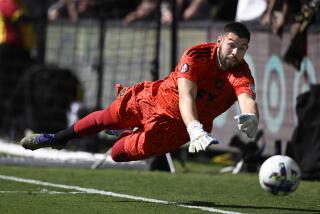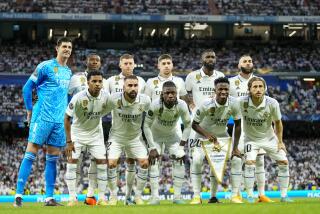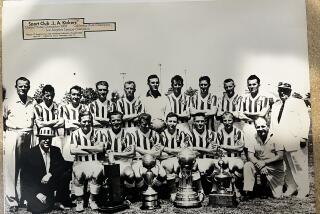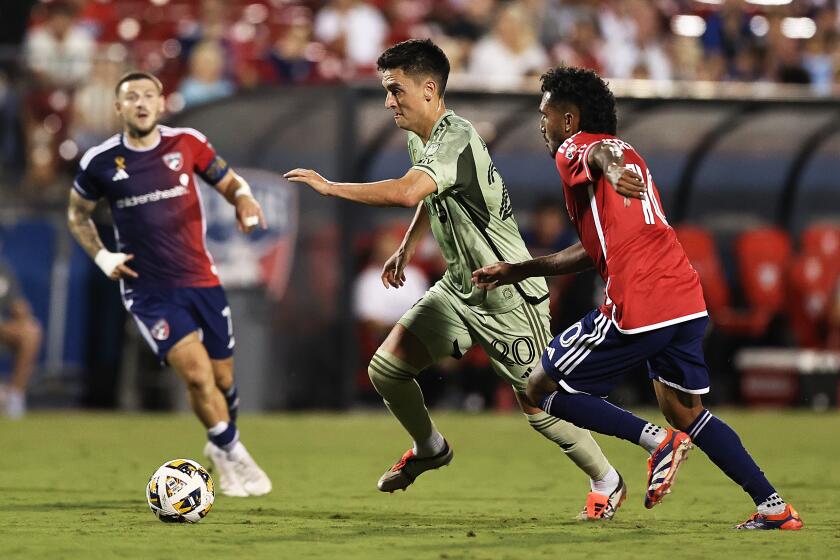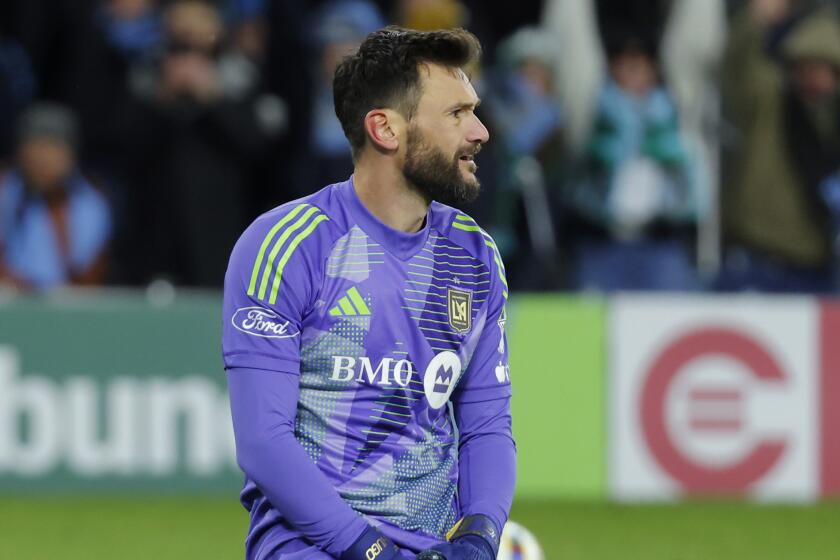Germany overwhelms Argentina, 4-0, to reach World Cup semifinals
Suddenly, it’s 2006 all over again in Germany.
Fans are turning out in the tens of thousands on the streets of Berlin, Hamburg, Munich and elsewhere to watch what is surely the best German soccer team put together in the past quarter-century.
That team, in a performance as devastating as it was comprehensive, demolished Argentina, 4-0, on Saturday to sweep into the semifinals of the 2010 World Cup.
“They did what we knew they were capable of doing,” said downcast Argentine forward Carlos Tevez.
“I feel like I have been hit by Muhammad Ali,” said Diego Maradona, Argentina’s coach.
Striker Miroslav Klose scored two of the goals, bringing his haul in three World Cups to 14, tying the German record held by Gerd Mueller and leaving Klose only one goal shy of the World Cup record of 15 held by Brazil’s Ronaldo.
Forward Thomas Mueller, no relation to his namesake, scored once and so did defender Arne Friedrich.
Germany took the lead in the third minute and never looked back. It was a motivated and tactically flawless performance, one that was unreservedly praised by Coach Joachim Low.
“What the team showed in terms of determination to win was the sort of thing you would expect from champions,” Low said. “It was absolute class.”
Indeed, Germany, with its fast-paced and fluid style, served notice that it is the side to beat now that the two South American powers, Argentina and Brazil, have been eliminated.
Certainly, the Netherlands, Spain and Uruguay will have something to say about that, but none of those other semifinalists have managed to bang in 13 goals while giving up only two.
Angela Merkel, Germany’s chancellor, had predicted victory on Saturday and so had Paul, the prognosticating octopus.
Merkel, who had hardly settled into her seat at Green Point Stadium before Thomas Mueller gave Germany the lead after 180 seconds, said it would be 2-1 in favor of the Mannschaft.
Paul, from his tank in the Sea Life Aquarium in Oberhausen, Germany, had not provided a score, but he appeared even more confident of victory than Merkel.
“I didn’t start to feel good about it until we went ahead, 4-0,” the chancellor said.
Considering that the final goal, Klose’s second, came in the 89th minute, Merkel should have been comfortable by then, but politicians, unlike octopi, are a cautious lot.
Germany’s victory, which sent it on to play Spain in Wednesday night’s semifinal in Durban, was the result of meticulous planning by Low and his coaching staff.
Low had said beforehand that he had spotted a weakness in Argentina’s team, but did not elaborate. In the game, the weakness became apparent — gaping holes in the South American side’s midfield that the Germans were quick to exploit.
Low also found a novel way to motivate his players. Before the 4-1 rout of England in the second round and again before Saturday’s match, he showed them videos of German fans celebrating in the streets, just as they had done during the run to third place in the 2006 World Cup when Germany staged the tournament.
“I think that’s the best motivation possible for our team,” Low said.
Midfielder Bastian Schweinsteiger, who was hugely influential in the win, said it “gives you goose bumps seeing the way people are celebrating at home.”
For Argentina, it was a bitter pill to swallow. Maradona’s side had looked impressive in its run to the quarterfinals and boasted, on paper at least, the best forward line in the tournament.
But in front of 64,100 on a sunny afternoon in Cape Town, those forwards, including world player of the year Lionel Messi, were foiled by a German defense that chased and harried and denied them time and time again.
Germany did not panic under pressure. Instead, the defenders remained amazingly calm and simply played their way out of trouble with short passes. Goalkeeper Manuel Neuer was outstanding.
For Argentina it was simply an afternoon when little went right. The loss meant that Maradona’s hopes of becoming only the third person to win a World Cup as a player and as a coach have to be put on hold, perhaps indefinitely.
Afterward, looking worn down and weary, he answered questions in a subdued voice during the postgame news conference, frequently shaking his head, his eyes downcast, seldom smiling.
He was circumspect about his future,
“I may leave tomorrow,” he said, “but I’d like these boys to continue showing who they are and to keep playing real Argentina football.”
The loss marked the second successive World Cup in which Germany eliminated Argentina in the quarterfinals, having done so on penalty kicks in Berlin in 2006.
